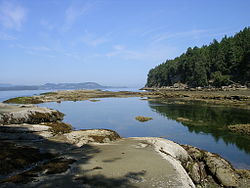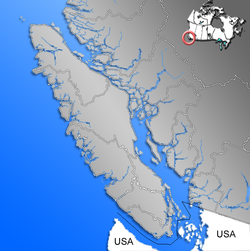Gabriola Island
| Gabriola Island | |
|---|---|
| Island | |

Beach at Descanso Bay
|
|
| Gabriola in the southern Gulf Islands | |
| Location of Gabriola, near Vancouver Island | |
| Coordinates: 49°9′0″N 123°43′58.8″W / 49.15000°N 123.733000°W | |
| Country | Canada |
| Province | British Columbia |
| Regional District | Regional District of Nanaimo |
| Area | |
| • Total | 57.6 km2 (22.2 sq mi) |
| Population (2006) | |
| • Total | 4,050 |
| • Density | 70.3/km2 (182/sq mi) |
| Time zone | Pacific Time Zone (UTC−8) |
| • Summer (DST) | Pacific Daylight Time (UTC−7) |
| Postal code span | V0R |
| Area code(s) | 250 |
Gabriola Island is one of the Gulf Islands in the Strait of Georgia, in British Columbia (BC), Canada. Gabriola lies about 5 kilometres (3.1 mi) east of Nanaimo on Vancouver Island, to which it is linked by a 20-minute ferry trip from Nanaimo harbour. It has a land area of about 57.6 square kilometres (22.2 sq mi) and a resident population of slightly more than 4,000.
Gabriola is endowed with public beaches and forests, and has an established community spread around the island. On the island, housing, roads, shopping centres, restaurants, a library, an elementary school, and a museum are found. Its cultural life includes annual festivals related to art, poetry, gardens, music, boating, and fishing. The Gabriola Arts Council hosts three large annual events: the Isle of the Arts Festival (in April), Gabriola Theatre Festival (in August) and Thanksgiving Studio Tour (in October). These events, plus many more, feature the wide range of artistic talents held on Gabriola Island, making it the "Isle of the Arts".
Gabriola is part of the traditional territory of the Snunéymux, and the name of the nearby city, Nanaimo, is an anglicized form of their name. The earliest archeological record on Gabriola is a cave burial dated to about 1500 BCE, but sites on nearby Valdes Island and other Gulf Islands have been found to date to at least 3000 BCE.
The pre-contact population of Gabriola has been difficult to estimate, but in mid-Marpole times—between about 0 and 1000 CE—several thousand people lived in the village at False Narrows, the site of today's El Verano Drive. Archaeologists have found that infant mortality at that time was surprisingly low and that the population was well adapted to its environment. Other smaller villages on Gabriola were scattered around the coast. After contact, and perhaps as early as 1500 CE, the population of the Snunéymux declined drastically because of smallpox and other diseases brought to North America by Europeans.
...
Wikipedia


